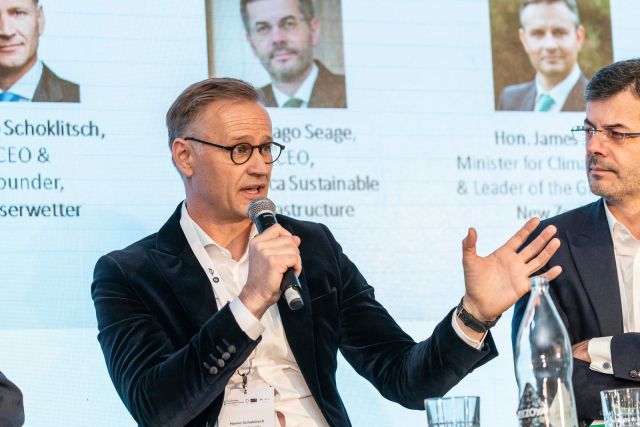Hanno Schoklitsch on how smart data analytics can be utilised to advance the energy transition
Ahead of the Sustainable Innovation Forum 2019 taking place in Madrid, Spain on the 10-11th December, we caught up with Hanno Schoklitsch, CEO and Founder of Kaiserwetter, to discuss how smart data analytics can be utilised to advance the energy transition.

Ahead of the Sustainable Innovation Forum 2019 taking place in Madrid, Spain on the 10-11th December, we caught up with Hanno Schoklitsch, CEO and Founder of Kaiserwetter, to discuss how smart data analytics can be utilised to advance the energy transition.
Q. Let’s start with some background on Kaiserwetter and its role in the renewable energy sector.
Any serious answer to climate protection encompasses economies and societies running on energy systems powered exclusively by renewables. Speeding up the energy transition is an absolute must-do. But just more renewable is not enough. We also need a more intelligent energy transition – be it regarding appropriate investments by financial institutions, be it regarding the right decision-making by governments and authorities. Data Analytics, Predictive Analytics and Machine Learning can make the crucial difference here. Kaiserwetter uses these approaches for its Data Analytics as a Service (DAaaS) offer which minimizes investment risk, maximizes return and reaches maximum transparency. We are convinced: IoT and AI are becoming key drivers for an effective climate policy and a successful, risk-minimized shift to a green economy. Providing these services is Kaiserwetter’s contribution to globate climate protection.
Q. It’s the year 2050, and the world has transitioned to zero-carbon. What does the energy industry look like?
Completely different to the energy industry today. The most predominant characteristic will be the radical decentralization of energy supply, including so called flexibility options like storage, load management, power-to heat or power-to-gas. Virtual power plants will assume a central role. All those technologies will help to realize a demand-side economic approach. This means that the power supply follows the energy demand. And for this approach AI is key. AI will help to optimize the match between regional generation and regional demand – something that is unthinkable without advanced data analytics. Against this backdrop you can clearly see that companies that provide Data as a Service like Kaiserwetter will become key players in the future energy industry, but also probably in all industries where an intelligent resource management will become a key challenge such as water, agriculture…
Q. This year, calls for ambition on climate action have reached an all-time high. How can smart data analytics be utilised to advance the energy transition? What specific challenges does it seek to overcome?
If we are honest enough, we have to admit that up to now, climate protection policy, including investments in green technology, has been more or less based on a trial-and-error approach. Let’s take Kaiserwetter’s home country as example. Germany has an installed renewable capacity of almost 120 Gigawatt whilst peak demand is never higher than 75 Gigawatt. Nevertheless, Germany is far behind its climate targets. You see: we need more efficiency and accurateness in climate policy. IoT and AI help to prevent false decision-making and failed investments. They are key for risk mitigation and enable to speed up the energy transition.
The key challenge is probably that - all talk of “data is the gold of 21st century” notwithstanding –many decision makers are not yet aware of the value of data for an efficient climate policy and a speed and effective energy transition. We need more decision-makers to attach salience to this issue.
Q. Why are IoT and AI still such innovative ideas in the climate protection and energy transition debate?
The energy sector is a very good example. For decades if not centuries, we have lived in a base load world which means than many power plants did run the whole year without any interruption and more or less independently from the actual demand. This has never been very efficient and the unintelligent usage of dirty energy resources is doubtlessly the main cause for the climate crisis. In this old energy world, resource protection and efficiency were not on the agenda and therefore data intelligence had no real value. It is important to understand the energy transition also as turn towards energy intelligence. And this requires Iot and AI. The same holds true for other critical resources, such as meat production, and for the circular economy in general.
Q. What is the importance of events such as the Sustainable Innovation Forum in progressing the energy transition?
It is a very important event for us. As previously said, IoT and AI are still new methods in the energy transition and climate protection discourse. For raising the salience of these methods, events like the Sustainable Innovation Forum play an important role.
Kasierwetter is a Gold Sponsor of the upcoming 10th annual Sustainable Innovation Forum taking place alongside COP25, 10-11 December in Madrid, Spain. To learn more about the agenda, the panels, the speakers and how to register, visit the event's official website here.

_400_250_80_s_c1.jpg)




